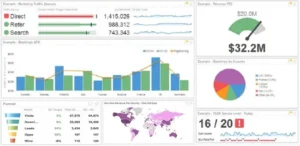The decision to choose Salesforce to run some or all of your business operations is a big one. Not only is the financial investment significant, but the changes in people’s every day routines are substantial as well. These factors all contribute to why decisions like this shouldn’t be made in haste.
You’ve probably spoken to other Salesforce users, or seen videos or demos on how other companies use the system, and that has led you to consider making the move. Be aware, though, that getting to that point can only be done with the strategic assistance of experienced Salesforce consulting teams. The part that often gets left out is how much time, effort and money went into making those solutions work.
Do I even need a consulting partner?
In short, yes. In order to fully leverage all that Salesforce can do, you should work with a consulting partner that’s versed in diagnosing your business’s requirements and manipulating Salesforce to support them. Here are a few reasons why…
Salesforce only does so much out of the box
Motivated usually by budget restrictions or unfamiliarity with Salesforce, many companies buy Salesforce licenses but not consulting services and expect the system to still have certain positive impacts on the business. While the fundamental aspects of Salesforce are functional from the start, the standard features are universal and always require some customization. This includes creating custom fields that your business tracks, streamlining user experiences by tailoring different layouts for different user groups, creating custom reports to track the analytics that your leadership deems important, and creating custom processes and automation that alleviate pain points for your employees.
Every company is different. So expecting the standard Salesforce features to strengthen the things that make your company unique from your competitors is an unrealistic expectation. A consulting partner will help identify this and then tailor the whole system to reinforce these differences.
Supporting Processes with Automation
Salesforce provides several different mechanisms for automating processes, each with different advantages and limitations. Working with a consulting partner will speed up the process of, not only identifying where automation will be helpful but also in designing the proper way of building it.
Security and Permissions
Salesforce also has many different ways to ensure that data is kept securely and is accessed by the appropriate users. Navigating between organization-wide defaults (OWDs), roles, custom permission sets, custom page layouts, and field level security can be very confusing for those not familiar with how they all work together. Working with a consulting partner will expedite determining what your security needs are and also how to configure them.
How Much Does Customization Cost?
There’s no magic formula to determine how much of your budget should be set aside for your Salesforce customizations. The critical processes that need to be improved, the amount of data being moved over, and the complexity of supporting those processes all factor into costs. Typically, most consulting partners will give an estimate on how much time they’ll require to get the system up and running and will then bill hourly for the various resources involved.
Ideally, a consulting partner would be engaged during the process of purchasing Salesforce licenses since these consultants also help outline specific requirements of the system and how leveraging multiple license types can save on licensing costs and still maintain the desired functionality. Nevertheless, regardless of where you are on your Salesforce journey, it’s never too late to involve a Salesforce consulting partner to build out the system roadmap.
What’s The Process of Working with a Consulting Partner?
Salesforce Consulting Partners serve as the translator between what Salesforce can do and what you need it to do. In order to do this, the consulting team will meet with you to understand and document how processes run at your company through a series of process review meetings. From there, all system possibilities are outlined, and the two sides agree on priority levels for each in building a system roadmap in conjunction with your budget.
Once the project roadmap is established, the consulting team will follow an agile project plan to configure a Salesforce system that streamlines those processes. Concurrently, the consultants will review any legacy data or integrated systems and also determine what sorts of data manipulation needs to take place in order to import it into Salesforce. The next step is to include end users in testing the system functionality in a sandbox environment where changes can still be made, followed by training for all end users and ultimately, an official launch of the system.
Conclusion
Undertaking these types of exercises without the help of consultants can be a lengthy process with potentially negative impacts on how people use and, more importantly, trust the system going forward. Since user adoption, the rate at which users accept the system, is of utmost importance to an investment like this, reach out to a Salesforce Partner like Cloud Next Level as soon as possible to ensure that your system has as successful of a roll-out as possible.







